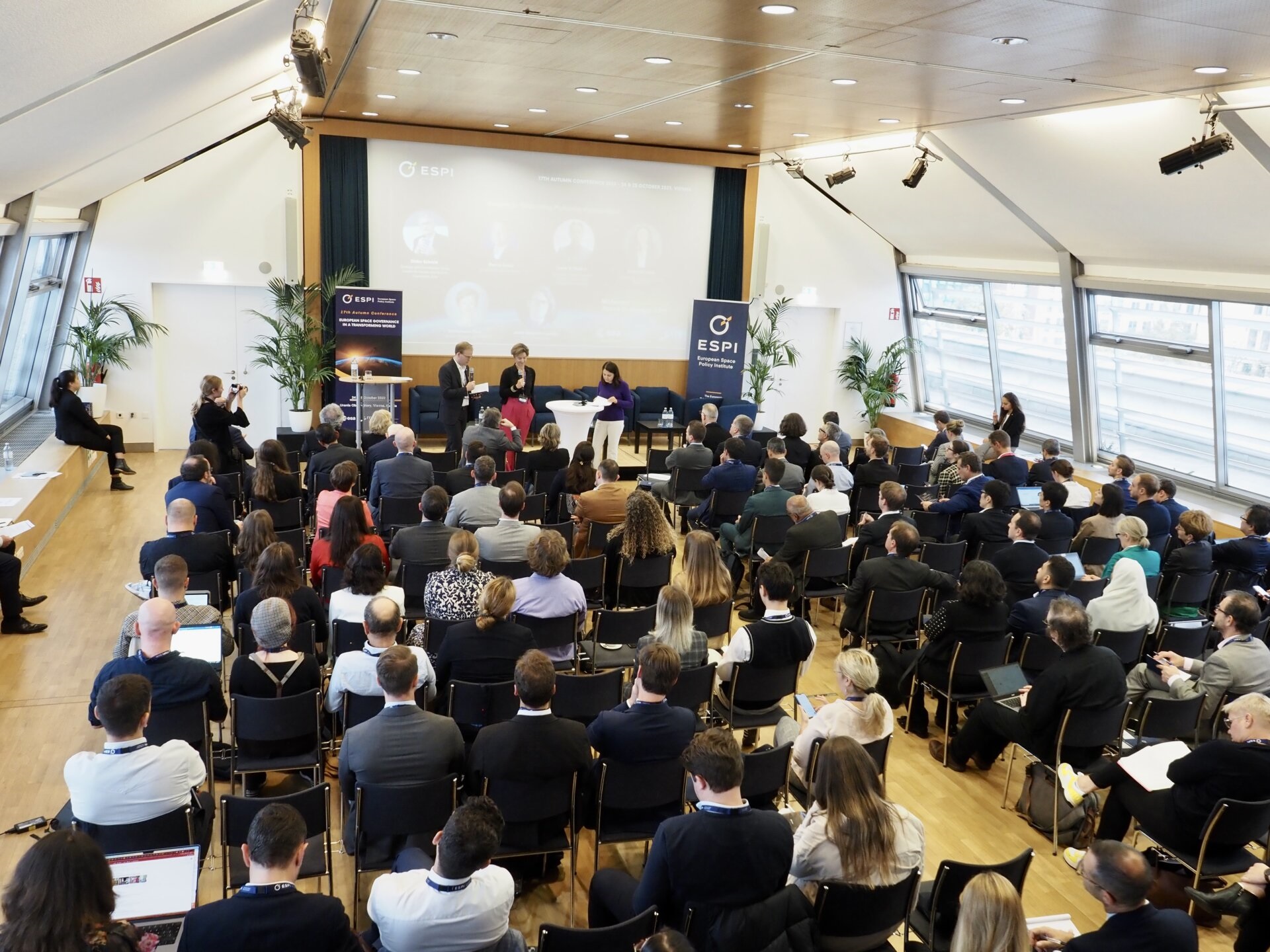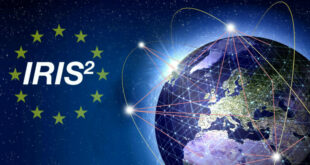By George Manouras

Europe’s dilemma
In the present era, the global landscape is shifting towards increased multipolarity. The world has been fractured in antagonizing spheres of political and economical hegemony, resulting in both competition and conflict. The Russo-Ukrainian war continues. China is broadening its economical and geopolitical influence through grand investments and the support of evolving economies. The BRICS have doubled their members and a variety of regional alliances appear to take shape. Europe faces the task of adjusting to the evolving power dynamics.
As with every aspect of society, the utilisation of space is influenced by the world’s geopolitical order. Space is part of the new domains that can alter sensitive regional balances and highlight existing asymmetries in military strength, thus raising the correlation between evolving space industries and security mechanisms to a strategic factor. At the same time, cooperation in the space domain has proven to be a crucial mechanism for broadening geopolitical influence.
Europe’s space program, throughout all its years of evolution, has been mainly focused on scientific and civilian purposes and the EU has played an important role in the development of international norms for retaining space as a safe non-militarized environment. However, with the current global geopolitical consensus being challenged, concerns are being raised regarding the EU’s ability to ensure its undisrupted non-dependent utilisation of space. Europe is facing a dilemma of critical importance for its future. Through which ways can the pursuit of strategic autonomy be combined with multilateral cooperation in order to ensure both Europe’s well-structured space development and the enhancement of its worldwide influence?
From a multipolar world to multipolar space
Europe faces the challenge of adapting to a world where power is gaining greater significance and intricate moral decisions are once again central in strategic choices. It needs to ensure its active participation while addressing fresh challenges and navigating trade-offs that might not align smoothly with its previous experiences. While multipolar systems may appear unstable, due to fluid alliance patterns and coordinating challenges, they can also exhibit stabilizing elements, through highlighting the widespread diversification of interests and the necessity of authentic multilateral institutional platforms.
Similar tendencies can be observed regarding a multipolar space environment. Due to the ITAR policy and the Wolf Amendment, China is one of the few space-faring nations that hasn’t had access to the ISS. This led to the deployment of its autonomous Tiangong space station. Russia has furthered away from the Gateway and Artemis programs and, after the Western sanctions, has announced the construction of its own ROS station. Both Russia and China have expressed deep concerns towards the Artemis Accords, regarding the lack of legislation for lunar activities, and accuse the U.S. of maintaining a new Cold War status, undermining the 1967 OST. In response, the two countries have initiated the ILRS program and have declared their intent for other nations’ involvement (with APSCO, Venezuela, Pakistan and the UAE already joining).
In an era of increasing multipolarity, Europe must adapt to new dynamics.
The E.U.’s strategic posture for the future focuses on reserving its strategic autonomy while at the same time effectively advancing multilateralism and regional cooperation. In this process the Union needs to leverage its inherent characteristics as a successful multilateral political and economic entity, which is based on the values of peace, democracy, cooperation and respect, and expand them in a changing global framework.
Europe’s Strategic Autonomy
In their article “Towards EU open strategic autonomy in a multipolar world”, M. Belka and P. Marques support that “the European Union functions as an economic giant and a political dwarf”. Other actors have stepped in to occupy Europe’s policy void, unhesitatingly employing trade as a leverage, exploiting the vulnerabilities of international organizations for their advantage, or employing development aid as a means of geopolitical expansion. Since the beginning of the Ukrainian war Europe’s incapacities, vulnerabilities and interdependence from rival ‘poles’ have been more and more profound. Europe faces the need to deploy a coherent plan in order to enforce its strategic autonomy in a fast reshaping world.
Regarding space, difficulties to deliver on time orbital flights even for the EU’s most sensitive satellites has been a critical hit to both its status and its operational capabilities. The current situation has pushed European officials to adopt a more “hostile” point-of-view when it comes to space, since the war led them to realize that space operations shall be highly integrated to security and defence in the new era of geopolitical tensions. The rearrangement of Europe’s posture towards a stronger unified military strategy has been set through the 2016 Global Strategy, enhanced through the 2022 Strategic Compass and implemented for the space sector through the
2023 Space Strategy for Security and Defense. Satellite Secure Connectivity (IRIS2) and Space Traffic Management have been on the forefront of Europe’s new space strategy.
The basis of strategic autonomy in a hostile space environment is to ensure the development of both early-warning systems and adequate defensive mechanisms. The E.U. is required to leverage from the creation of unified policies that shall take into account the ways its space assets are interconnected with the industrial and civil sectors of its Members. By clarifying how different stakeholders are affected by the discontinuation of space operations, the Union needs to efficiently guide future missions and R&D for space security in order to produce harmonized measures within its framework, avoiding national fragmentation. The EU has already engaged in this path by deploying integrated cyber-security in both space-hardware and ground stations, advanced encryption methods and development of relevant protection requirements and standards that can protect space assets from electronic warfare interference.
Europe should also focus on the acceleration of technology diffusion between various space actors with respect to security measures. In the NewSpace Age, how technology spreads from different domains (academia, research, industries, etc.) to the space sector could prove a matter of vital importance. What is more, Europe should invest in its capability to develop flexible spacecraft launches from European soil, as well as leverage the immense advances that commercial space launching enterprises can bring in space-vehicles. Losing the ability to utilise both the Soyuz launchers and the Baikonur launchpads has highlighted Europe’s gap in frequent space launches.
Multilateral Cooperation on Earth and Space
In the context of an emerging multipolar world, Europe encounters the challenge of acknowledging the necessity of nurturing specific ties with emerging or established ‘poles’, outside the Euro-Atlantic coalition. More and more emerging economies tend to adopt multilateralism as a mechanism to contain more powerful states (especially the US). Europe’s approach to structuring a network of ‘strategic partnerships’ should be driven by the fact that these emerging powers are essential for tackling crucial global challenges, including trade, international finance, humanitarian, and security issues.
Europe has a longstanding positive posture towards space diplomacy and cooperation. However, it needs to further encourage collaboration and dialogue among nations and space-entities in order to develop common standards, protocols, and norms for responsible behaviour during the NewSpace Age. For example, multilateral agreements and international collaboration of different stakeholders regarding space debris tracking, Avoidance and Removal could enhance its international ties. This can, also, involve efforts to strengthen existing agreements, like the OST, or establish new ones to address emerging challenges, such as the U.S.’s ASAT test ban resolution.
Europe is facing a dilemma of critical importance for its future.
Implementing transparency to foster trust among space-faring superpowers is also a critical factor for advancing multilateralism. This process could include scientists’ exchanges, international forums, information sharing and bilateral cooperative activities, such as joint space missions. ESA’s past involvement in the preparation of manned missions to the Tiangong space station along with its contribution to the future Chang’e-6 Lunar Exploration Mission could be considered as examples that pave the way for loosening multipolar tension in space.
The EU, also, needs to “build its credibility with countries in the Global South through sustainable partnerships that go beyond traditional aid and lending programmes” as Iveson and McNair comment in an article. For the Union to maintain a substantial global presence, it’s crucial to interact with developing nations, tackle poverty and climate crisis, and provide trustworthy development plans for its partners. Europe’s space cooperation with the Global South cannot be limited to data exchange and connectivity projects (Copernicus, Galileo & EGNOS) either. Emerging spacefaring nations need to deploy their own domestic solutions based on their
industrial base, resources, scientific capital and regional cooperation. Enhancement of satellite production and launching capabilities could prove to be acts of strategic importance for the E.U.’s international space ties.
During a period when tensions against the involvement of Western countries in the Global South rise, if the EU needs to exceed the rapidly growing influence of Russia and China it should invest in building alliances and restoring credibility by following a different pattern.
Conclusion
In an era of increasing multipolarity, Europe must adapt to new dynamics. The global landscape is shifting, marked by competing spheres of political and economic influence. Space, as a critical domain, reflects these changes, intersecting opposing interests. Europe must secure its space assets while promoting multilateral cooperation. Its path to strategic autonomy lies in combining rapid technological advancement with its strength as a multilateral entity built on the values of peace and cooperation. Europe’s space strategy has focused on security and defence in response to evolving threats, while at the same time highlighting the importance of space diplomacy, multilateral cooperation and common standards. Engaging with developing nations necessitates sustainable partnerships and adding value on domestic space industries besides traditional aid. In this multifaceted landscape, Europe’s actions in diplomacy, security, and collaboration will define its role in a rapidly changing world and its space domain.
This article was the winner of the inaugural 2022 ESPI Autumn Conference Essay competition.

George Manouras is a highly motivated and dedicated Physicist and Space Engineer based in Athens. With a Bachelor’s degree specializing in Astrophysics, and a Master’s in Space Technologies, Applications and Services, he is characterized by his endless space-oriented passion. His Master’s thesis delved into the intricate analysis of the defense and security aspects of the Russian and Chinese space programs, examining the space history, policies, priorities, and strategies employed by both countries. He has actively sought opportunities to expand his expertise in the field of Space Politics and its implications on Security and Defense. He won the inaugural 2023 ESPI Autumn Conference Essay Competition and was recently appointed as a new member of the European Centre for Space Economy and Commerce (ECSECO) and the Space Generation Advisory Council (SGAC). This comprehensive foundation has provided him with a deep understanding of space international frameworks, regulatory schemes and policy landscapes.





